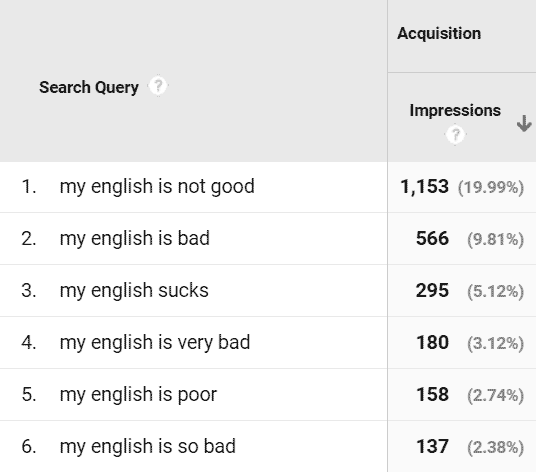Do you think your English is bad?
You are not alone.
The other day I was checking my website’s stats and saw this:

These are the search terms people typed into Google to find this page.
As you can see, all of them say the same thing:
I am bad/terrible/poor/not good at English.

The words people use can tell a lot about themselves. And these search terms indicate that these people were focusing on the problem (their English is bad), not the solution (how to improve their English).
If they were focusing on finding the solution, they would have used a more goal-oriented term like, “How can I improve my English,” or, “How to learn English.”
This problem-focused mindset is not good. Unless you start thinking about finding solutions, your English will never improve.
So let’s change your focus and think about ways to improve your English instead.
Here are 5 baby steps you can take to improve your English.
Step 1: Find the root cause of your poor English
First, you need to dig deep and find out why your English is not good.
And no, it’s NOT because you don’t know how to improve your English. There’s already a lot of good advice, techniques, and tips for that.
The reason is something else…
Something is preventing you from taking action to improve your English, and you must find out what it is.
Is it because you lack self-discipline? Perhaps you can’t get yourself to learn English consistently?

Is it because you don’t have time to learn? Then why don’t you have time? Is it because you’re spending too much time on other activities like social media or YouTube?
Or maybe deep down you really don’t want to put an effort to learn English. It’s hard work to force yourself to read, listen, and practice speaking English, so you procrastinate by passively consuming content about learning English (but you never actually do anything productive).
Or is it because of some other reason?
Unfortunately, no one can help you identify the reason. This is something you must investigate yourself.
But if you can be brutally honest with yourself, you’ll find the real cause of your bad English.
Step 2: Deal with it
Once you find the root cause, you must find a way to resolve it.
For example, if the reason is a lack of self-discipline, then learn to improve your self-discipline.
If the reason is that you have no time, then remove or reduce the amount of time you spend on certain activities.
If it’s because you don’t like to read, listen, and practice English, well…I don’t have a suggestion for that. (Maybe learn to enjoy the process?)
Nevertheless, if you don’t do something about it, you’ll keep running into the same problem. You will continue to fail to take action consistently, or continue to complain about not having enough time, or keep searching for more tips and techniques for improving English.
All right! Stop reading now and go do steps 1 and 2. These two steps are very important and can take weeks, months, or even years to complete depending on the severity of the problem.
Of course, you can continue reading, but unless the problem is eliminated, it will not make any difference.
Step 3: Pick one thing to do each day to improve your English

After you fully address the thing that’s preventing you from improving your English, improving your English will be much, much easier.
Now you can start taking action. (Something small and manageable.)
I suggest picking one learning activity to do daily.
For now, choose either reading or listening. These two activities are the foundation of language learning. You can’t go wrong with either of them.
Next, decide when you’re going to do the activity:
- First thing in the morning.
- Before bed.
- During odd periods like commuting or waiting for an appointment.
At first, don’t try to do it for like an hour a day. You’ll fail to hit the target and feel bad about yourself and give up.
Aim for a smaller number, somewhere between 10 and 30 minutes.
Baby steps.
See if you can get yourself to do the activity every day (or at least four days per week).
If you fail to do so, lower the number.
Now, if you still fail to do the activity consistently at this point, it means the root cause hasn’t really been solved yet, or maybe you’ve identified the wrong root cause. Which means you must go back to steps 1 and 2.
Unfortunately, many people will never be able to resolve the issue and their English will never improve. (It’s sad. I know. But that’s how life is. It’s impossible for everybody to succeed at anything they want.)
However, if you’re able to do the activity on a regular basis without much trouble, then proceed to the last step.
Step 4: Add more learning activities to your routine
Once reading or listening has become ingrained in your routine, you can get a bit more ambitious.
Start adding one more learning activity to your routine, maybe something that targets a different English skill.

For example, if your current activity is reading, you can add listening or speaking practice to your routine.
You can read my guide on how to learn English where I share a number of activities you can do.
If you can reach this point, congratulations! You won’t have to say, “My English sucks,” or, “Sorry for my bad English,” ever again.
Thanks for reading. I hope this will help you successfully improve your English.

